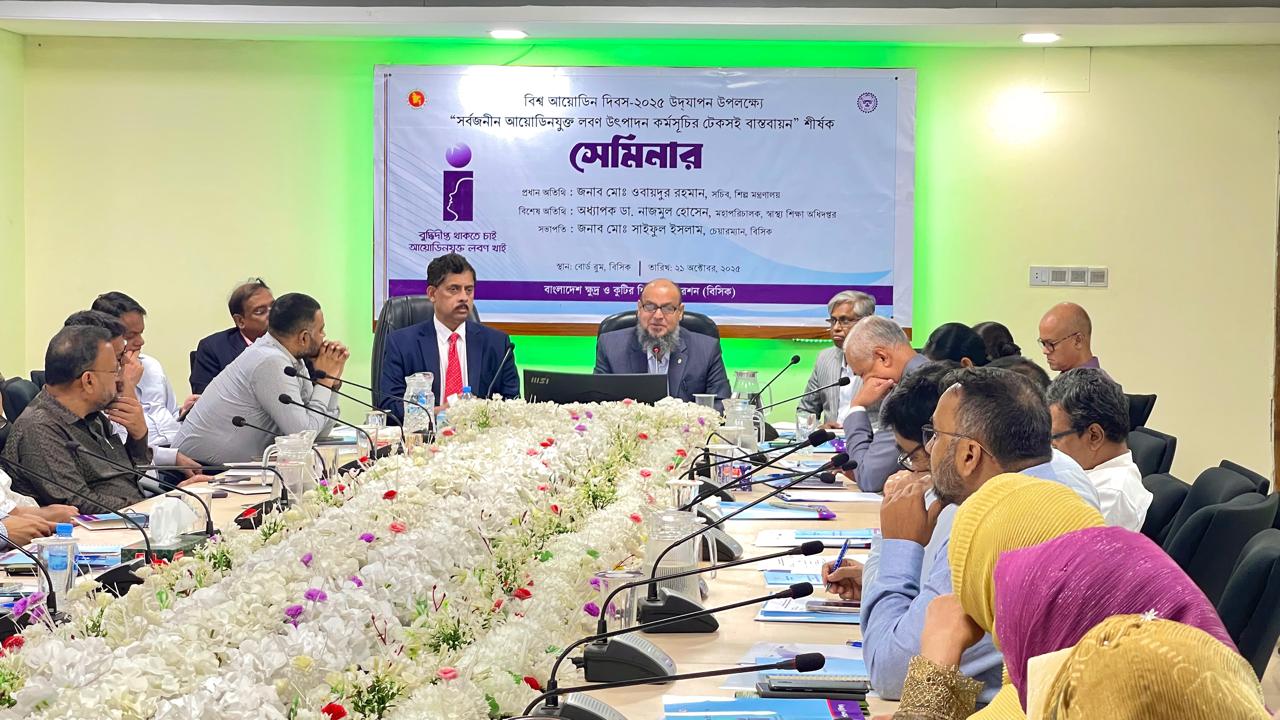News Flash
News Flash

DHAKA, Oct 21, 2025 (BSS) - Bangladesh is close to achieving international recognition for self-sufficiency in iodized salt usage, which is granted when 90 percent of a country's population uses iodized salt.
Around 76 percent of households are currently using iodized salt and the nation needs to bring just 14 percent more people under the coverage of iodized salt usage to achieve this recognition.
The information was reveled today at a seminar marking the celebration of the ‘World Iodine Day-2025’ at the Bangladesh Small and Cottage Industries Corporation (BSCIC) Bhaban in the city, said a press release.
BSCIC hosted the seminar focusing on the resolution of iodine deficiency disorders (IDD) and raising public awareness.
Industries Secretary Md Obaidur Rahman attended the seminar as the chief guest while BSCIC Chairman Saiful Islam presided over it.
Director General of the Directorate General of Health Education Dr Nazmul Hossain was the special guest at the programme while Portfolio Lead for the Large Scale Food Fortification GAIN Bangladesh Dr Ashik Mahfuz presented the keynote paper.
Iodine deficiency is recognized as a significant public health issue globally, and it remains one of the major micronutrient deficiency problems in Bangladesh.
The seminar emphasized that iodine is an essential component or micronutrient that is indispensable for the normal, mental, and physical growth of humans.
The seminar highlighted major successes in combating IDD. Prior to the 1990s, iodine deficiency problems were severe in Bangladesh, particularly in northern districts, where visible goiter patients were commonly seen on the streets.
The absence of sufficient iodine can lead to serious conditions, including goiter, dwarfism, premature abortion, and physical and mental disability. Even if goiter is the primary problem mentioned, a lack of proper iodine intake hinders intellectual improvement.
To overcome these issues, the government launched the Universal Iodized Salt Production Program in the 1990s, managed by BSCIC under the Ministry of Industries. This effort involved registering salt mills, providing technical assistance, supplying potassium iodate, and monitoring the market and mills.
As a direct result of three decades of hard work, visible goiter and dwarfism have been completely eradicated from the country. The National Nutrition Survey of 1993 reported that 8.8 percent of people suffered from visible goiter and 0.6 percent from dwarfism.
Md Obaidur Rahman stressed that all citizens must be conscious of this issue, stating that awareness alone can eradicate all iodine-related diseases.
Dr Ashik Mahfuz noted that Canada was the first country to begin salt fortification.
Regarding fortification in Bangladesh, he explained that Potassium Iodate is used in the salt making it sustainable it does not degrade if left open or near a stove.
He also highlighted the necessity of daily consumption, as iodine is not stored in the body, meaning the daily requirement runs out every day.
Director (Industrial Development and Expansion) BSCIC Md Khairuzzaman, Chief Salt Cell of BSCIC Dhaka Sarwar Hossain, Country Manager of the TechnoServe, Bangladesh Md. Gulzar Ahmed and President of the Bangladesh Salt Mill Owners Association Nurul Kabir joined the seminar as discussants.
Attendees included representatives from development partners Nutrition International (NI) and GAIN, the Bangladesh Salt Mill Owners Association, various ministries, government and non-government institutions and salt mill owners, general consumers.